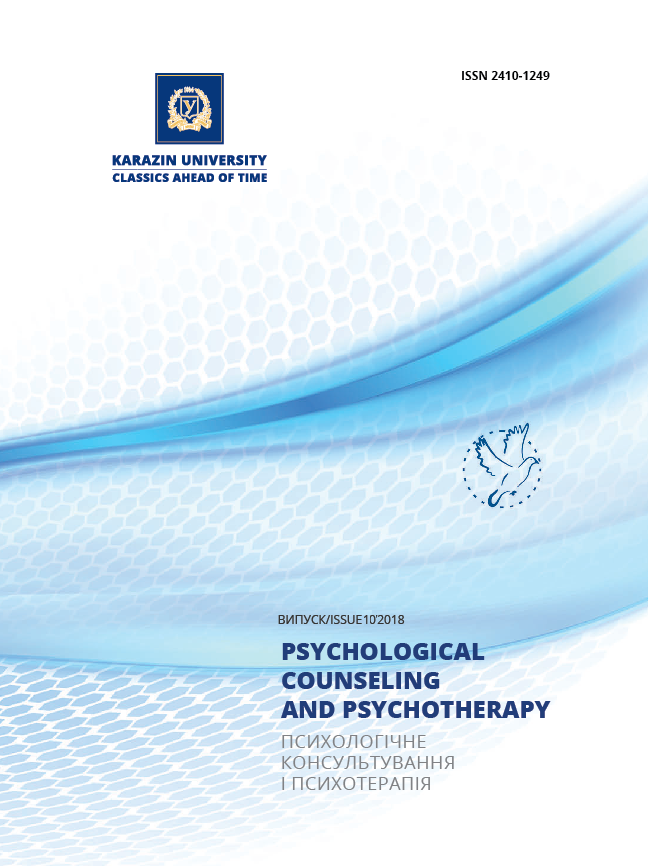Psychological characteristics of parents of problem children
Abstract
The article presents the investigation of the characteristics of the personality and emotional sphere of parents having problem children and identify the relationship of these features with respect to children. The scientifically based material presented in the article provides statistical analysis of the data obtained during the factorization of the source empirical data obtained with the help of standardized assessment means. The subject of statistical analysis at this stage was to test the hypothesis of significant differences in the level of severity of personality factors of the subjects, grouped in different categories based on gender, age, family status and family functioning. In particular, reliable differences in the level of personality factors in the subjects of different sexes were found in relation to «constructive educational protection», «indulgently indifferent personal disposition», «passive-protective personal disposition» and «psychosthenic personal disposition». Statistically significant differences in the level of personality factors in the subjects with different family status were detected in relation to «extroverted personality disposition», «the indulgent educational disposition» and «constructive educational support». According to the results of the statistical analysis of age characteristics of the expressiveness of the personal factors of the parents of the problem children, statistically significant differences were identified according to the factor of «constructive educational protection», «introverted-pedantic personal disposition» and «indulgent educational disposition». The statistical analysis of the indicators of the severity of personality factors in the subjects with different types of family functioning allowed to reveal statistically significant differences in a number of factors: «major educational disposition», «constructive educational protection», and «Introverted-pedantic personal disposition».
Downloads
References
Byul A., Tofel P. (2002). SPSS. Искусство обработки информации: анализ статистических данных и восстановление скрытых закономерностей: пер. с нем [Art of information processing: analysis of statistical data and the restoration of hidden patterns: Transl. from Germ.]. St. Petersburg: Diasoft YUG LLC. (in Russian).
Eidemiller E., Yusitskis V. (2009). Психология и психотерапия семьи [Family psychology and psychotherapy]. St. Petersburg: Peter. (in Russian).
Garbuzov V.I., Fesenko Yu.F., (2013). Неврозы у детей [Neurosis in children]. Moscow: Kogito-Center. (in Russian).
Mamaychuk I.I. (2006). Психокоррекционные технологии для детей с проблемами в развитии [Psychocorrectional technologies for children with developmental problems]. St. Petersburg: Rech. (in Russian).
Nasledov A.D. (2004). Математические методы психологического исследования: анализ и интерпретация данных [Mathematical methods of psychological research: analysis and interpretation of data]. St. Petersburg: Speech. (in Russian).
Nasledov A.D. (2005). SPSS: компьютерный анализ данных в психологии и социальных науках [SPSS: Computer Analysis of Data in Psychology and Social Sciences]. St. Petersburg: Peter. (in Russian).
Rechitskaya E.G., Puzanov B.P., Bogdanova T. (2012). Психолого-педагогическое сопровождение лиц с нарушением слуха. Учебное пособие для ВУЗов [Psychological and pedagogical support of persons with hearing impairment. Textbook for universities]. Moscow: Prometheus. (in Russian).
Semago N.Ya., Semago M. M. (2000). Проблемные дети: Основы диагностической и коррекционной работы психолога [Problem children: Basics of diagnostic and correctional work of a psychologist]. Moscow: ARKTI. (in Russian).
Schmidt V.R. (2007). Psychological Assistance to Parents and Children: Training Programs. Moscow: TU Sphere.
Varga A. (2000). Теория семейных систем Мюррея Боуэна. Основные понятия, методы и клиническая практика [Murray Bowen Family Systems Theory. Basic concepts, methods and clinical practice]. Moscow: Kogito-Center. (in Russian).
Yatsenko T.S. (2015). Динамика развития глубиной психокоррекции: теория и практика [The dynamics of the development of psycho-correction depth: theory and practice]. Dnepropetrovsk: Innovation. (in Russian).
Zakharov A.I. (2010). Дневные и ночные страхи детей [Day and night fears of children]. St. Petersburg: Rech. (in Russian).








